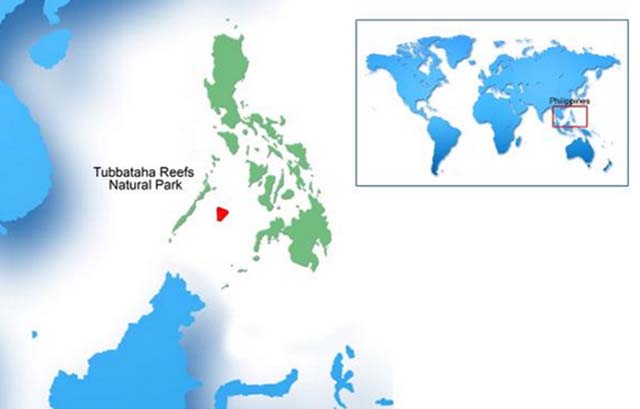SUMMARY
This is AI generated summarization, which may have errors. For context, always refer to the full article.
 A citizen’s suit has been issued in the Philippines against the US Navy in an attempt to hold it liable for environmental damages following the alleged unlawful entry and grounding in January of the USS Guardian in the country’s Tubbataha Reefs Natural Park.
A citizen’s suit has been issued in the Philippines against the US Navy in an attempt to hold it liable for environmental damages following the alleged unlawful entry and grounding in January of the USS Guardian in the country’s Tubbataha Reefs Natural Park.
The Reefs comprise a marine ecological park within the “Coral Triangle” — an area which marine biologists characterize as the global center of marine biodiversity, akin to the Great Barrier Reef. Listed by UNESCO as a World Heritage Site, the grounding of the Guardian and subsequent partial destruction of the reef as a result have been a source of serious concern for environmentalists and nationalists in the Philippines for months.
The Guardian ran aground while transiting the Sulu Sea after completing a port call at the former US naval base of Subic Bay, en route to its next port of call in Indonesia. What was an Avenger-Class mine sweeper doing in Philippine waters, and in the middle of the UNESCO Site?
At the time of the grounding, no joint military exercises or war games were being conducted by the US and Philippine navies, nor had there been any declaration of war or any armed conflict rising to the level of “armed conflict” as defined under international law, nor was an “armed attack” was imminent within the meaning of the US-PH Mutual Defense Treaty of 1951.
Unlike the Spratly Islands and the Scarborough Shoal, for which there has been a great deal of diplomatic sparring in recent years between the six state claimants (which include China, Vietnam, and the Philippines), the Guardian was grounded in the middle of the Sulu Sea, a body of water considered to be internal waters of the Philippines over which the state can exercise full sovereignty and jurisdiction as if it were land.
When it became apparent that the Guardian could not be lifted or towed from the damaged reef, Vice Admiral Scott Swift, Commander of the US Seventh Fleet, gave the order to cut the vessel up so that it could be safely removed. After 10 weeks of salvage and post salvage operations involving no less than 15 heavy vessels, the final sections of the ship were lifted from the Reef and sent to Japan at the end of March.
Curiously, on April 8th a Chinese boat ran aground in the same Reef, but unlike in the case of the Guardian, the 12 Chinese nationals aboard the vessel, posing as “fishermen,” were arrested, the ship was impounded, and charges were filed. It was alleged that the Chinese poachers attempted to bribe the marine park rangers with US$2,500 to arrange their release. While they were detained in the provincial jail in Palawan, the Chinese Consul General and the Chinese embassy’s Third Secretary flew there and held a closed-door meeting with Philippine authorities. Additional bribery allegations subsequently were made against the Chinese representatives.

Philippine authorities led by no less than President Aquino were quick to pursue legal action against the Chinese, while to date no criminal charge had been filed against the crew of the Guardian, suggesting a double standard at work.
Old ties
While acknowledging that the United States is the Philippines’ closest ally in the Pacific and that, prior to the decommissioning of US military bases in Clark and Subic Bay, the Philippines was home to the largest force deployed in the East, following the Guardian’s entry and grounding, anti-American sentiment is now on the rise in the Philippines.
Some legislators are calling for the abrogation of the Visiting Forces Agreement – presumably the basis for the Guardian’s passage into Philippine waters – and of the Mutual Defense Pact of 1951. US troops left the Philippines in 1991 following the expiration and congressional non-renewal of the Military Bases Agreement of 1947, but a “Visiting Forces Agreement,” patterned after NATO’s Status of Forces Agreements, took its place.
Anti-American sentiment peaked during the Reagan era, but left-wing groups today argue that the Visiting Forces Agreement circumvents what is now a constitutionally entrenched prohibition of “permanent” military installations in the Philippines without Senate concurrence. Environmentalists are also quick to point to the discharge of toxins, heavy metals, and untreated sewage into the ground and water in and around former Subic Bay, which was then America’s largest naval base in the Pacific, and at Clark Air Force Base.
In fact, in 1992 the US General Accounting Office (GAO) estimated the clean-up would cost more than USD12-15 million per site. While US Air Force and Navy officials identified significant environmental damage at both bases, the GAO report concluded that “the current basing agreement does not impose any well-defined environmental responsibility on the United States for environmental cleanup and restoration.”
The same goes for the current Visiting Forces Agreement, so argues the petition against the Guardian crew. The petition against the Guardian raises novel questions because it is the first time a claim has been raised presenting a clear nexus between the environment and foreign military troops.
Public interest groups argue that the government’s latest valuation for environmental damages and impact in the World Heritage Site is far too low, considering the US’s own treatment of the grounding of the USS Port Royal in 2009, where the State of Hawaii demanded the US Navy pay between $25 million and $40 million. In the case of the Guardian, local authorities are demanding just $1.4 million.
Will the exertion of extraterritorial federal power make a case for differential treatment between Hawaii and the Philippines?
The Polluter Pays Principle under international legal norms requires federal agencies to subject themselves to legal standards “no less severe” than those which would apply for any equivalent environmental damage occurring within their country under comparable conditions and in comparable zones.
To hold otherwise would be allowing unprincipled differential treatment. If the US Navy concedes to the latest figure, surely it will be proof of double standard at work. – Rappler.com
Edsel Tupaz is counsel for petitioners in this case. He is a public interest lawyer and a professor of international and comparative law, based in Manila, Philippines. He is a graduate of Harvard Law School and Ateneo Law School. Follow Edsel Tupaz on Twitter: www.twitter.com/edseltupaz
Add a comment
How does this make you feel?
There are no comments yet. Add your comment to start the conversation.